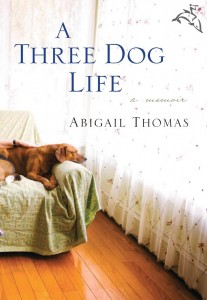 At a time when memoirists are often told the story that will sell to a publisher is the “noisy” story that can most reliably garner headlines, links and clicks—and therefore, sales—it feels like vindication that Abigail Thomas’ work stands out on the shelf for a different reason: It is real, relatable life, beautifully written. It’s car accidents and cancer and love affairs, how Thomas responds to these difficult (but not entirely uncommon) events, and how they shape her and her relationships. Woven throughout are accounts of the furniture her dogs destroyed, her latest painting, a meal cooked, pulling nettles from the garden, a visit with an old friend, drinking too much.
At a time when memoirists are often told the story that will sell to a publisher is the “noisy” story that can most reliably garner headlines, links and clicks—and therefore, sales—it feels like vindication that Abigail Thomas’ work stands out on the shelf for a different reason: It is real, relatable life, beautifully written. It’s car accidents and cancer and love affairs, how Thomas responds to these difficult (but not entirely uncommon) events, and how they shape her and her relationships. Woven throughout are accounts of the furniture her dogs destroyed, her latest painting, a meal cooked, pulling nettles from the garden, a visit with an old friend, drinking too much.
And thank God. Thank God for the lack of hype and drama, the absence of flash and sentimentality. Thank God for a writer and books that slowly and quietly creep into our hearts, and expand them. When I read Abigail Thomas’ work, I feel like I’ve been gifted with an important life lesson about what’s important. I breathe thanks for her willingness to examine her life, give herself grace for the parts where she behaved as a flawed human, and withhold judgment of the rest, as it gives others permission to do the same. Her honesty gives me courage. Her gratitude opens the spigot for my own. More gifts.
Thomas came through Seattle on April 27, and though I was on the tail-end of a head cold and my neck and chest were lit up with a siren-red heat rash—a special thing I get with any manner of illness—I put on mascara and wore a puffy scarf and attended the event with my friend Melinda, who is also a memoirist. On the way there, we’d driven not a hundred feet from Melinda’s house when she noted (about Thomas), “it’s the things she doesn’t say.”
It is that, too. The space that Thomas creates with “the things she doesn’t say” allows for the things she does to have more impact. Not everything has to be in neon lights, nor do we want everything to be in neon lights.
 Thomas’ reading—oh hell, I’m going to call her Abigail from now on, or even Abby. Abby’s reading was just like her writing. She is the kind of person who leaves you wishing she was your next-door neighbor, and that there was a gate in the middle of the fence between your houses, or no fence at all. At 71, she wears bright green booties, revels in old stories of young lovers and drops f-bombs. She is delightful. And, to my surprise, she glowed equally brightly when she talked about teaching others to write memoir.
Thomas’ reading—oh hell, I’m going to call her Abigail from now on, or even Abby. Abby’s reading was just like her writing. She is the kind of person who leaves you wishing she was your next-door neighbor, and that there was a gate in the middle of the fence between your houses, or no fence at all. At 71, she wears bright green booties, revels in old stories of young lovers and drops f-bombs. She is delightful. And, to my surprise, she glowed equally brightly when she talked about teaching others to write memoir.
This energy may be why yesterday, as I lay in congested misery on the sofa with a box of tissue and my pug, some epiphanies about what I next need to do on my own memoir started to emerge. I’d already agreed with my agent back in January that I would undertake revisions, based on thoughtful (rejection) feedback we received from the initial batch of submissions to publishers. And then I went to Africa for a month, and I wrote a bunch of short pieces, and I went to LA—all ways of putting off what wasn’t coming easily to me in the first place. But yesterday, snotty and hot, and without any effort, I remembered something Abby said: “If you end your memoir where you think it’s supposed to end, you probably haven’t ended it in the right place.” Also, the honesty part. I wasn’t dishonest in the ending of my manuscript, but I wrapped it up too neatly, and in doing so, glossed over some of the truth.
I’m finally excited about digging in to these revisions. Rather than attributing this shift to the mini-delirium that comes with a head cold, I’m going to thank Abby Thomas. In her authenticity, I found a new appreciation for the power, and necessity, of my own.
Tell me about a writer or book who moved or inspired you!